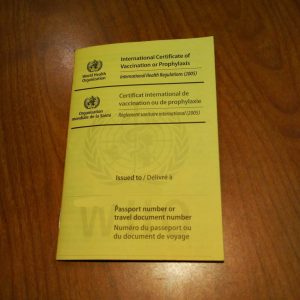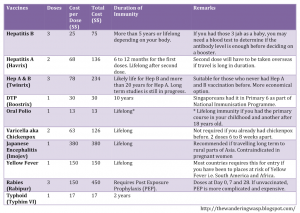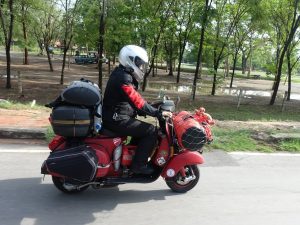Falling sick on the road is a major turn off – you feel awful, your plans get disrupted, no comfort of your home for recuperation, language barrier with medical staff, dubious quality of the medications and medical costs are few of things to deal with on top of physical crankiness.
The good news is, many of the diseases can be easily prevented with prophylaxis or vaccines, or with some precautionary measures.
Travel Medicine Clinics can be found in the following Singapore hospitals.
- Tan Tock Seng Hospital
- Changi General Hospital
- Singapore General Hospital
- Khoo Teck Puat Hospital
- Raffles Hospital
Due to the complexity and long duration of my travel itinerary, I have to consult a doctor. If you are unsure if you need to consult a doctor, you may call them up to check. I was informed that doctor consultation cost $68. I did not have to wait long for an appointment. I called up on Friday and was able to secure an appointment for the following Monday.
Tan Tock Seng Hospital’s Travellers’ Health and Vaccination Clinic (THVC)
11 Jalan Tan Tock Seng, Singapore 308433
Location: Clinic 4B, Level 4, TTSH Medical Centre
Tel: 6357 2222
Email: thvc@ttsh.com.sg
Opening hours
Monday to Friday: 8.00am – 5.30pm (Last walk-in appointment at 5:00pm.)
Saturday: 8.00am – 12.30pm (Last walk-in appointment at 12:00pm.)
Sunday & Public Holiday: Closed
Before Your Visit
- List down the places that you will be visiting, urban or rural places and the duration of stay. You may wish to do a quick research on CDC website to find out what is required for your destinations.
- If your travel itinerary is complex and long, consult your doctor 2 to 3 months before departure. Some vaccines require booster shots over a period of one month to 6 months. Other than that, 4 to 6 weeks before departure is recommended.
- Bring your health booklet along (remember that blue booklet issued in primary school? It holds your vaccinations record.) and any other records of past vaccinations. The doctor will thank you for it. Some vaccines confers life-long immunity and are redundant if you have them before.
- Print and fill up this form. Attach a list of countries if the space is not enough. Provide tentative dates if your travel is open-ended in nature.
- Make sure you are feeling well if you have going to receive your vaccinations that day.
- For ladies, check if you are pregnant. Some vaccines are contraindicated in pregnancy. Doctor and nurses always ask when is your last period for this reason.
- Bring a notebook to take down health advices from the doctors if you think you cannot remember everything.
At the Clinic
I was guided by the receptionist to the comfy couch in the waiting area and soon helped myself to a cup of hot Milo at the dispenser. Before I could take a sip, my name was called up.
In the office, the doctor introduced herself as Prof Lim. Over the next one and half hour, Prof Lim went through the list of places that I will be travelling and went through all the different health risk and precautions at different areas .
She occasionally referred to this book called The Yellow Book which is the CDC Health Information for International Travel. You can find the entire book here. There are advices for all the travel related ailments, from infectious diseases to altitude sickness.
Prof Lim travelled extensively when she was my age, sometimes solo, sometimes with friends. So far, she has been to all the continents except Antarctica. The consultation was at times like an entertaining story-sharing session.
“Once in a long while, I get special cases like yours. Open plan travel for a long duration. A few years back, I saw a couple who was travelling around the world on their motorcycle,” she said. I knew she was referring to Goh and Samantha.
Whatever information found here cannot replace a doctor’s years of expertise. Please consult a doctor for your travel vaccine requirements. I am different from you in terms of medical, vaccination history and travel itinerary. Please do not try to play smart alec based on information found on Wikipedia. They are not reliable.
After consulting Prof Lim, I need to get 1 oral and 11 injectable vaccination in total, covering almost everything! A nurse later scheduled the vaccinations with instructions from Prof Lim.
 |
| The Yellow Booklet which holds all your vaccination record. It is an official document for re-entry into some countries. Please refer to Yellow Fever section below. |
Common Travel Vaccines
Hepatitis A
This virus causes inflammation of liver and is transmitted by oral-fecal route. There is no cure for this, only supportive care available. You will need two dose. The first dose will last for 6 months to 1 year, the second dose administered within 6 to 11 months after the first dose will confer life long immunity.
I eventually received my booster shot in Islamabad, Pakistan.
Hepatitis B
Most Singaporean were vaccinated against it when they are babies. Whether another booster shot is required depends on the antibody titre level in your blood. A blood test can determine that. If it is low, you will need another booster shot to stimulate your body into making more of the antibody.
I had my booster shot done as a poly student as it was required for my internship. I have family members who are chronic carriers. Donated blood are routinely screened for Hep B antigen, and in my case for antibodies too. Being a regular blood donor, I have not heard anything from the blood bank about my blood being unsuitable for donation.
Looking at my history, Prof Lim thinks I am already immunised so I do not need it. Always consult your doctor if in doubt.
There is a 2-in-1 vaccine for Hep A and B which is more economical for those who need both.
Polio
Remember that nasty bitter liquid that was dripped into our mouth in Primary 6. Another dose after age 18 will confer lifelong immunity.
Diptheria, Tentatus, Pertusis (DTP)
A 3-in-1 vaccination which is administered to all Primary 6 Singaporean students as part of the National Immunisation Programme. It lasts for only 10 years. If you are in your twenties, you will need another dose of it.
Diptheria and Pertusis (aka whooping cough) are highly infectious. Tentanus is transmitted via an open wound exposed to Corynebacterium diphtheriae which is often found in rusty or low-oxygen environment.
Chickenpox (Varicella)
Often known as a common childhood disease, symptoms in childhood are often mild. However, chickenpox in adult can sometimes lead to severe symptoms that requires hospitalisation. Our former Prime Minister Goh Chok Tong was hospitalised for Chickenpox at age 67.
I never had chickenpox. It is advisable that I get vaccinated. Chickenpox is highly infectious and getting it during travel means difficulty in finding a hotel or hostel that can take you in. 2 doses, 6-8 weeks apart confers lifelong immunity.
Japanese Encephalitis (JE)
This is caused by a virus transmitted by mosquito. Encephalitis means inflammation of the brain. There are incidences of JE throughout Asia, commonly in rural areas. You can click the link in the title to find out the geographical distribution. There is no cure for it. Fatality is 20-30% and 30-50% of survivor suffers from some form of brain or neurological damage.
Short term travellers restricted to urban area have little risk of contracting it.
There are two types of vaccines available for JE. I will be taking Imojev which is a one dose, life long vaccine and also the most expensive of all (S$380). As this is a live weakened form of the virus, Imojev is not suitable for pregnant women.
Typhoid Fever
Often associated with poor sanitation, transmitted by fecal oral route. Recommended if you are travelling to Southern Asia.
Rabies
Singapore has been enjoying a rabies free status for a long time. Getting bitten by animals is not as much of a big concern as in other countries. In India, threats of rabies are very real. My Indian colleague developed a phobia of dog because he witnessed how his uncle passed away after getting bitten by a rabid dog. If untreated, fatality is 100%.
The course of rabies vaccination includes 3 doses, at Day 0, 7 and 28. Completed course does not eliminate the need for treatment after getting bitten. It only simplified the Post Exposure Prophylaxis (PEP). Upon getting bitten or exposed, you will need two booster of rabies vaccination at day 0 and day 3.
If you have not received rabies vaccines before, the PEP is much more complicated. You will need 4 or 5 doses rabies vaccines over a period of 2 weeks to a month. On top of that, you must be administered rabies immunoglobulin.
Rabies immunoglobulin are very expensive (a few thousands dollars based on body weight) and may not be available in developing countries. They are antibodies isolated from a human or horse who has been previously been immunised against rabies.
Prof Lim told me cases of Bali visitors getting bitten by monkey. They had to be evacuated to Singapore to receive rabies immunoglobulin as it was not available there.
Yellow Fever
This is another viral disease transmitted by mosquitos. If you have travelled to countries with risk of Yellow Fever i.e South America, you need the Yellow Fever vaccination certificate to enter many other countries. I was not sure if I will be travelling there and asked Prof Lim if I could take the jab during my travel once I have decided. I could. However, it is better to get it done here because my records are here. If I ever lose the Yellow Booklet, I can always approach TTSH to retrieve the record. If it is done else where, it will be difficult to do so. Anyway, it confers lifelong immunity.
Malaria
Again, mosquitos are the vector for spreading malaria. Malaria is caused by protozoan Plasmodium.
There are no vaccines available for Malaria. Antimalarial tablets are the next best bet on protection. They have to be taken before travelling to malaria endemic areas and after leaving. There are many different types of antimalarial tablet out there with different pros and cons and contraindications. What further complicates malaria prophylaxis is the prevalence of drug-resistant strains of Plasmodium in different regions of the world.
I was prescribed Mefloquine based on my itinerary and budget. A small percentage of people have adverse effect to Mefloquine. I was asked if I had history of depression and heart abnormalities. I could have a test dose a month before departure to check if I fall into that small percentage. Do check with your doctor on this.
There is no one-for-all solution for malaria prophylaxis.
Since many of the above mentioned diseases are transmitted by mosquitoes, the other precaution is to prevent yourself from getting bitten in the first place – covering up, mosquito nets, coils, mosquito repellent containing DEET. The higher the concentration of DEET, the longer lasting the protection.
High Altitude Sickness
Prof Lim also covered high altitude sickness and pointed out the symptoms to look out for.
At the end of the consultation, she gave me prescription for the antimalarial tablet and medications for high altitude sickness.
Ending off….
There was a lot of absorb in that one and half hour. It was almost like attending Medical Microbiology lectures. If you have a problem with memory, do bring a notebook to dot down the advices.
On top of discussion on vaccines, Prof Lim also gave advice on food and drinks to avoid, i.e. no fresh veges and ice in drinks while in India.
So this is briefly what I have learnt about Travel Medicine. These are only general advices, but there are a lot more which I did not mention here. The doctor knows best and will be able to advise based on your itinerary and health condition. I hope this is helpful for your travel. I wish you good health during which. Do drop me a comment if you have any questions.
 |
| Some of the common travel vaccines and their price from Tan Tock Seng Hospital. (Price valid for Singaporeans as on 7th March 2015. There is a 15% surcharge for foreigners.) |






10 thoughts on “Getting Travel Vaccinations in Singapore – Staying Protected and Healthy for Long Travel”
Glad that it helps!
I happened to come across your page and it's been an interesting read! Thanks so much for the information on vaccines btw! (: Was just wondering how much the malaria tablets cost for you though? I'm also heading to Brazil this coming July!
Hi Winnie, there are many types of malaria tablets. They have different frequency of administration. Some daily, some weekly, some monthly. Based on the region I am visiting and budget, I was prescribed Mefloqine for 6 months. The tablet costed $1.40 or $1.60 each.
Very helpful! Thank you!
Thanks for the super-informative post! I was trying to check whether SGH or TTSH is cheaper. Good luck on your great adventure!
Thank you.
I am glad that it helps.
FYI in case you want to update your post: Yellow Fever vaccine at TTSH now costs $188
Did you payed cash or with credit card.
cash